 Petzlover
Petzlover African Serval is originated from South Africa but Javanese is originated from United States. African Serval may weigh 12 kg / 27 pounds more than Javanese. African Serval may live 5 years more than Javanese. Both African Serval and Javanese has same litter size. Both African Serval and Javanese requires Low Maintenance.
African Serval is originated from South Africa but Javanese is originated from United States. African Serval may weigh 12 kg / 27 pounds more than Javanese. African Serval may live 5 years more than Javanese. Both African Serval and Javanese has same litter size. Both African Serval and Javanese requires Low Maintenance.
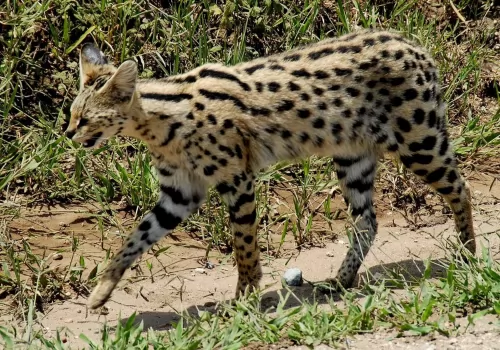 The African Serval is a wild cat that hails from Africa. You’ll see them on Africa’s savannas where there is tall grass and reeds, preferably near water.
The African Serval is a wild cat that hails from Africa. You’ll see them on Africa’s savannas where there is tall grass and reeds, preferably near water.
If you want to own a serval cat, you have to check whether you require licenses and permits as they are particularly difficult to rehome once you have owned one. Humans have kept them since ancient times, but they are not domesticated cats as such.
Breeding servals arrived in the United States many decades ago. Breeders have also crossed serval cats with domestic cats to produce hybrids, one of which is the Savannah cat.
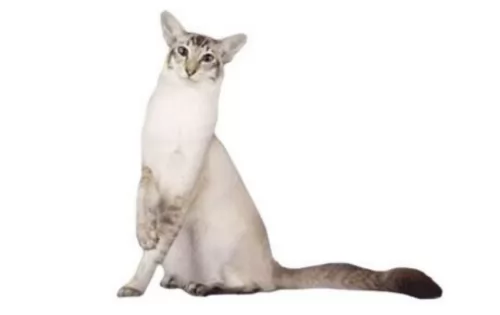 The Javanese is also known as the Colourpoint Longhair in some cat registries, but it's a purebred domestic cat that was developed in North America.
The Javanese is also known as the Colourpoint Longhair in some cat registries, but it's a purebred domestic cat that was developed in North America.
It was Helen Smith that coined the name Javanese cat in 1950 with the name being derived from the tradition where cats of the Orient have the names of the countries and islands of south-east Asia.
The name Javanese was chosen by choosing Java, an island near Bali.
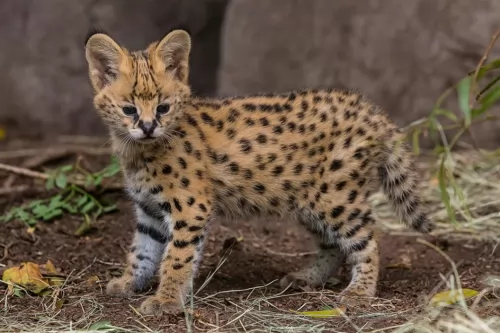 The Serval is a medium to large-sized cat that stands at between 54–62 cm in height and weighs in the region of 9–18 kg.
The Serval is a medium to large-sized cat that stands at between 54–62 cm in height and weighs in the region of 9–18 kg.
Some people think its a cat that looks similar to a Cheetah and this is because it also has a small head. It is known for its large ears which are black at the back with a large white dot. The attractively patterned coat is both spotted and striped with black against a golden/tawny shade.
These wild cats make a number of different noises - high pitched cries to growls, spitting sounds and purring. Another well-known feature with the cat is its particularly long legs. The tail has some black rings and it is black-tipped. The eyes of the Serval are a brown/greeny color.
The Serval cats will only come together for mating and then they resume their solitary lives. Gestation lasts for roughly 73 days after which up to 6 kittens can be born. In captivity, a Serval can live to be about 20 years of age.
The Serval is an active cat night and day. They are solitary animals not known for strong social interactions with humans but they can be playful with the few humans he gets to know.
People need to always know that owning a wild pet like this comes with risks. Not only that, a Serval wants to mark its territory and while you may provide a litter box, it's not to say he will use it.
They are able to bond with humans to some extent, more so if they were hand-fed from early on. They bond with one person and can form an affectionate relationship with that one person.
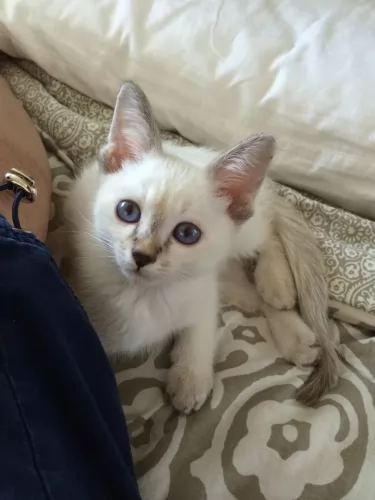 The Javanese is a medium-sized, slender, muscular cat that weighs between 3 and 6kg. It has a short or long, silky coat that comes in a number of colors. The short-haired variety has a single coat, in contrast to the double coat found in the long-haired breeds.
The Javanese is a medium-sized, slender, muscular cat that weighs between 3 and 6kg. It has a short or long, silky coat that comes in a number of colors. The short-haired variety has a single coat, in contrast to the double coat found in the long-haired breeds.
The tail is fairly plumed. The Javanese also has point coloration which means that the body is paler than the darker face. The coat comes in a variety of colors and patterns, from dark brown to cream to tortoisehell and others. The ears are large and the almond-shaped eyes are always blue.
Siamese and the Javanese differ a little in coat length and color but otherwise they are much the same in temperament. They love their human families and will follow them around like a dog.
When you sit down they like to curl up in your lap and simply be around you. They may not be as vocal as the Siamese but he is still prepared to have a jolly good conversation with you.
They’re clever cats too and like stimulating games and toys. He loves to climb, so a climbing tree will be excellent for him. He also likes being busy, so if you leave him alone for a length of time, ensure that he has activities to keep him happily amused.
If you have a Javanese be sure to include him in your activities just like you would a child of yours.
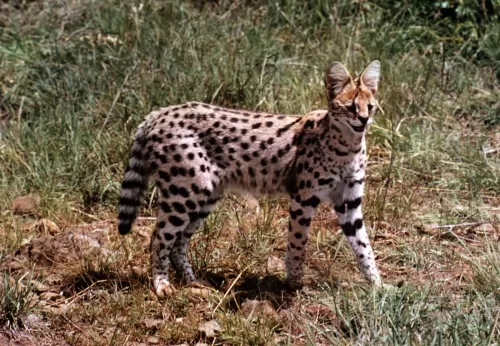 The African Serval is a wild animal and should be left in the wild.
The African Serval is a wild animal and should be left in the wild.
However, if you do decide to bring one into your home as a pet, they aren’t recommended for homes with young children or for a first-time pet owner.
Their play is rough and they like to use their teeth and claws during play. If the child gets hurt, then in typical unfair human fashion, the Serval is the one who suffers. They are capable of making good pets though but it is not recommended.
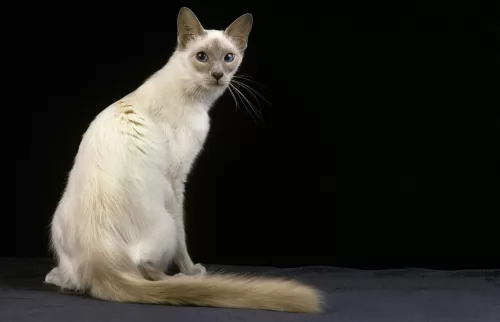 Your medium-sized Javanese cat is active and talkative. These are cats that love leaping up onto high perches and into trees and it is therefore imperative that you invest in climbing equipment for him.
Your medium-sized Javanese cat is active and talkative. These are cats that love leaping up onto high perches and into trees and it is therefore imperative that you invest in climbing equipment for him.
These slender Oriental cats need an excellent diet to maintain the fine-boned, muscular physique. You don’t want your Javanese becoming overweight as this spells bad health and sluggishness.
The Javanese is such a lively cat if his weight is maintained and he loves being around his human family, purring away while he is lovingly made a fuss of.
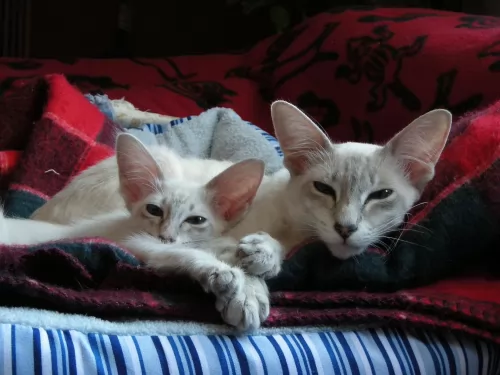 The same health issues that you’re likely to pick up with the Siamese may well be found in the Javanese too.
The same health issues that you’re likely to pick up with the Siamese may well be found in the Javanese too.
Some of the health issues to look out for include among others, asthma or bronchial disease, heart defects, lymphoma as well as gastrointestinal conditions.
For the health of your Javanese cat, make sure the vaccinations are up to date.
 The Serval is a wild cat so in the wilds it eats prey such as frogs, birds and reptiles. They are known for leaping high into the air to catch prey but they will also burrow into holes to get prey out.
The Serval is a wild cat so in the wilds it eats prey such as frogs, birds and reptiles. They are known for leaping high into the air to catch prey but they will also burrow into holes to get prey out.
You should try to provide your Serval pet with some whole prey. Do research on the food of Servals because you will need to offer your wild pet a feline supplement. There are also formulated pelleted food, but this shouldn’t form the bulk of his food but rather be a supplement to his meats. Choose a variety of meats such as chicken, mice, turkey, beef, duck as well as rabbits and birds.
If you keep a serval, it is imperative that it has large outdoor areas to roam in. They’re nocturnal animals, so they become more active at night. They’re used to living near streams in the wild so some kind of pool will be required for him, possibly even a fish pond where he can catch his own fish.
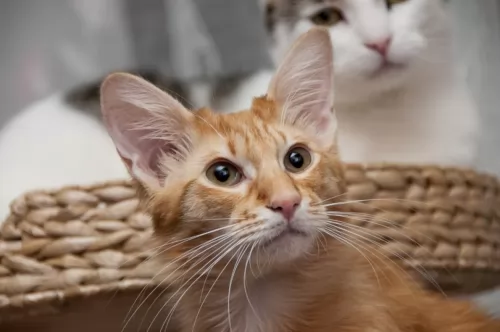 Cats are carnivores and have special dietary needs. They have unique nutritional needs, something like lions and cheetahs.
Cats are carnivores and have special dietary needs. They have unique nutritional needs, something like lions and cheetahs.
Their protein needs are very high, especially when they are kittens or nursing mothers. They need animal protein in their diets. Some of the unique nutritional needs of cats require them to have this protein as well as very important amino acids such as arginine and taurine.
Just because your cat needs such a high intake of protein, it doesn’t mean he won’t need other nutrients. Cats need balanced nutrition that is right for them. The best commercially manufactured cat food with fats, carbs, minerals, and vitamins will ensure a healthy cat. Speak to your vet if you’re not sure.
Not all cat foods are the same and choosing the right cat food will ensure your cat gets a sufficient dose of protein powder. So important is a cat’s diet for good health, that it will be important to speak to your vet about the food requirements of cats.
With grooming, the fine silky coat can be cared for easily by giving it a brush each week. You want to remove loose hairs from shedding. You can also take a damp cloth and wipe your Javanese down.
The nails will also need to be trimmed. When you brush your cat, check up on other things too.
Make sure the eyes are nice and clear, the fur soft and vibrant, make sure there are no new and unusual lumps.
Check inside his mouth for bad teeth that could be causing all kinds of health issues and check inside his ears too. For all these grooming issues, a pet grooming parlor can do it all for you.
Provide your Javanese with a litter box and keep the box scrupulously clean.